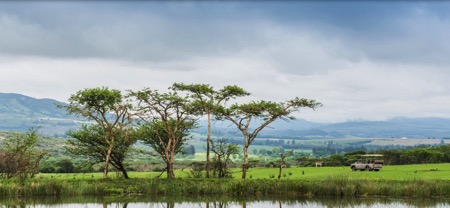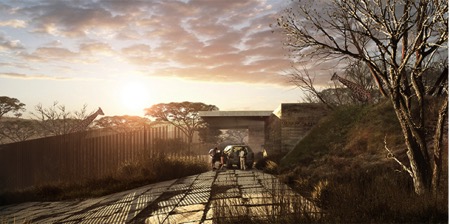Mahathunzi
Architecture designed to disappear into the landscape
13/01/16 12:22 Filed in: Property

LIVING WILD - AN INVISIBLE HOME ON A SOUTH AFRICAN NATURE RESERVE
German Industrialist First To Buy At Mahathunzi Whose Architecture Is Designed To ‘Disappear’ Into The LandscapeIf you are dreaming of a home in unspoiled Africa, living among the continent’s big game animals and astonishing bird life, there is a small development in South Africa with your name on it. Just 49 homes are going up on the border of a nature reserve that has won internantional plaudits – Karkloof Safari Spa. On its border the Mahathunzi development will be the African home to those lucky 49 buyers.
The name "Mahathunzi" tells you precicely what you will be getting. It is from the Sanskrit word "Maha", which means greatness, and the Zulu "ithunzi", which means shadow or aura. And the place starts off with an aura of greatness which the architecture is designed to enhance. Plans for the area to become a UNESCO protected reserve are in the pipeline.
A renownded South African architectural practice Elphick Proome which has experience across seven African countries and includes the construction of safari lodges and homes have the design brief.
Their latest challenge, set by Mahathunzi owner Fred Wörner, is to build 49 eco-homes, each on its own 80 acres of lush subtropical bush, on the border of the spectacular Karkloof Safari Spa in KwaZulu-Natal. This almost secret, hidden escarpment valley, fringed with cliffs, waterfalls and mist forest is, according to lucky visitors, a piece of heaven on earth where time truly stops. Karkloof is a wellness and wildlife retreat, that mixes a very successful game breeding programme with one of the best spa resorts in Southern Africa.

First to commit to buying a plot (two in fact) at Mahathunzi is German engineering industrialist, Robert Fellner-Feldegg, 50, whose company produces leading water valves for dams and hydro power projects, and his wife Eva, a designer and editor. They decided to buy and build following six visits to the Karkloof Safari Spa where they fell in love with the landscape and nature. They have been visiting South Africa up to ten times a year since 2004.
Robert says: “Besides the fantastic area, it was the architectural concept, with the absolutely professional developing team around it that gave us the confidence to take on such a project from abroad. The fact that Hilton College was close by was another factor influencing our decision as one of our sons will board at Hilton. The house we are building has two levels absolutely integrated into the landscape. A family part and a guest part. It will be an ‘island’ for us and our guests. We always have a positive impression of the people and the country and we always feel very well here. So we hope to spend between three and six months a year at Mahathunzi.”
So how do you square the circle when trying to build a no-impact property in a nature reserve? It is a tough challenge but Fred Wörner says he will ensure that it happens in the most sensitive way possible. He says: “The site is so spectacular that it demands homes that are built sensitively, demonstrating an intense humility in relation to the landscpe. They have to be the least intrusive, least impactful, leaving the lightest footprint possible.” Client expectations he says will be for distance from neighbours, privacy, space and connectivity to nature.
He points out that the site is unique in being utterly wild and unspoiled yet offering access to city life just 15 minutes away in Pietermaritzburg or an hour into Durban. The distinguished school, Hilton College, one of the best in the country is a near neighbour. Hilton College has a student exchange programme with: Eton College (England); Gordonstoun (Scotland); Harrow School (England); Wrekin College (England); Salem Schule (Germany); and similar schools in the USA and Australia.

The aim at Mahathunzi is ultimately to allow one to live at one with nature and the animals who call this place home. So drinks at sunset on your own deck will be with giraffe and antelope on hand, a luxury not available to many. There will be none of the larger dangerous animals kept within the bounds of the game reserve itself. The birdlife brings its own dazzling charm and something that is not there, is one of the greatest luxuries, the lack of any man-made noise. The silence between the birdsong lulls one into a different mind-set, aided by the signature scents that can only be Africa.
Glass walls, deep shaded verandas and infinity swimming pools all link the homes to their surroundings, bringing Africa right into your living room as you sit by the fire. At night the splendour of the African night sky adds a new dimension to the pleasures of this place. Roofs will be of living turf or fieldstone making the homes virtually invisible from above and in the veil of the bush.
Fred Wörner, comments: “Our major interest is from Europe and the USA, but also from China, South Africa and Nigeria. The buyers are people who want wildlife estates without the work involved in running a safari park themselves. A concierge service will take care of everything they need when they are here or abroad.”
Mahathunzi, is an unspoiled paradise with plains, cliffs, valleys, rivers and acacia bush, covering 1,000 hectares. The presence of a huge variety of wildlife literally on your doorstep, grazing peacefully, is a sight that stays with you forever. The houses in this development will be almost invisible so that the landscape remains as intact as possible. The 49 plots of between 60 to 80 acres start at R4 million (£200,000), value-added tax (VAT) excluded.
"The primary objective for the houses at Mahathunzi is to respect the surrounding environment," says Wörner. He describes the guideline calling for simple, elegant structures, designed to be almost unnoticed in the "hiding" and merging with nature. Each is likely to be between 800 and 1,100 square meters and could be either fragmented buildings or single forms.

“The 49 owners will choose the site themselves and the house will meld into the contours and slope of the land. We will incorporate all the established trees into the design. The living areas will face northwest to the sunset and the dramatic views of the Karkloof Valley with the Albert Falls Dam in the distance. The bedrooms are designed with a view to the southeast, including Otto's Bluff, so you will wake up to the sunrise. The houses built with stone from the site and from local hardwoods will boast a rough textured quality. “The concept is to build homes that grow into and merge with the landscape, says Wörner, and he concludes: “"The challenge for this property, lies in the design of houses that master the art of disappearance."
These secretive hidden homes in this enchanted valley will include sustainable features, natural ventilation, large porches, low-power components and low-energy building materials. The cost of houses in Mahathunzi depend on size, building materials and finish. Costs would be around R20 000 per square meter (£1,000) for what is in effect a home on your own private safari park, but without the costs of running the park.
First to commit to buying a plot (two in fact) at Mahathunzi is German engineering industrialist, Robert Fellner-Feldegg, 50, whose company produces leading water valves for dams and hydro power projects, and his wife Eva, a designer and editor. They decided to buy and build following six visits to the Karkloof Safari Spa where they fell in love with the landscape and nature. They have been visiting South Africa up to ten times a year since 2004.
Robert says: “Besides the fantastic area, it was the architectural concept, with the absolutely professional developing team around it that gave us the confidence to take on such a project from abroad. The fact that Hilton College was close by was another factor influencing our decision as one of our sons will board at Hilton. The house we are building has two levels absolutely integrated into the landscape. A family part and a guest part. It will be an ‘island’ for us and our guests. We always have a positive impression of the people and the country and we always feel very well here. So we hope to spend between three and six months a year at Mahathunzi.”
For more info please visit www.mahathunzi.co.za